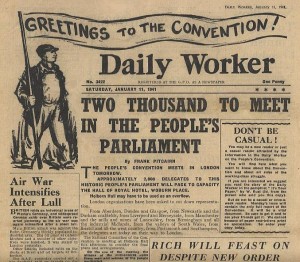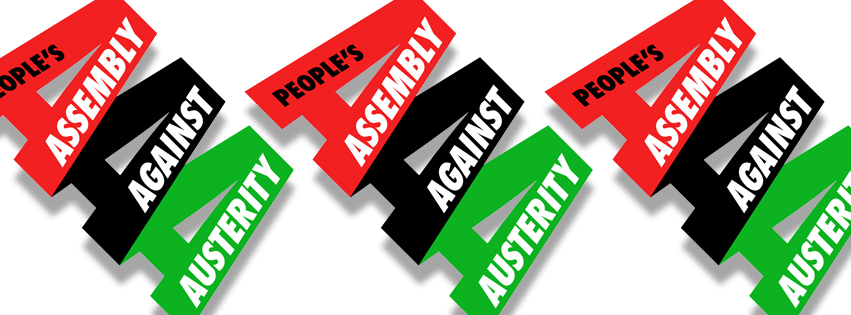On the History of People’s Assemblies
On 22nd June a People’s Assembly will meet in Central Hall Westminster to plan a fightback against Government austerity measures, Keith Flett looks at the history of similar gatherings.
It will of course excite much debate on the left but will also hopefully lead to something actually happening to protect the poor and disadvantaged from the clobbering the Government of millionaires is currently dishing out.
My purpose here however is to look at the history of such gatherings. We need to go back to the 1790s and the London Corresponding Society resolution that it would have members unlimited.
As EP Thompson underlines in the Making of the English Working Class the impact of this, to us straightforward statement, was revolutionary. Until that moment in the 1790s the numbers in any organisation were limited to the great and the good. Ordinary people were not considered to be fit participants. Any significant gathering of people openly in public was seen by the Government as a challenge to its authority, to be dispersed, harassed and possibly prosecuted for conspiracy. All these things happened to the LCS but they carried on.
However the official view of gatherings in the first half of the nineteenth century remained one of great concern. This was not yet a society where mass participation in politics or any form of organisation was welcomed.
After Peterloo in 1819 when unarmed protesters for the vote in Manchester were cut down by the army, a series of measures, the Six Acts were introduced which further restricted the ability to meet and organise. In particular the Seditious Meetings Prevention Act required the permission of a magistrate for any gathering of more than 50 people that was going to discuss matters related to the Government
Meeting legally became a significant issue.
William Lovett noted of the 1839 Chartist Convention that :
The rules and regulations for conducting our proceedings, drawn up by myself, were next agreed to, and a barrister consulted for ascertaining the legality of our objects, whose opinion, though very guardedly worded, seemed satisfactory to the members.
Those attending the meeting- 53- had been elected by mass meetings. Again Lovett notes:
The Birmingham meeting was composed of 200,000, the Manchester meeting of 300,000, that of Glasgow of 150,000, of Newcastle of 70,000, and other towns equally large in proportion to their population. The number of delegates composing the Convention was fifty-three, many of them representing several places, with the view to economy.
The Convention met in London and later Birmingham over a period of weeks. A call for a General Strike- a sacred month- was eventually made and this took place in August 1839. In November 1839 there was an attempt at an armed rising.
Organisational forms began to change with the rise of the challenge of the organised labour movement, and the State was always ready to restrict or ban gatherings, whether picket lines, demonstrations or rallies. The ticketed indoor gathering became by the third quarter of the nineteenth century the one potentially acceptable form of gathering where the mass platform-outdoor rallies- certainly was not.
Historians have tended to view these matters as historically settled but recent decades have suggested that this is far from the case as Government’s have challenged the right to protest and assembly in a number of ways.
Even so the tradition set by the Chartists of Assemblies or Conventions to discuss and reach a view on what should be done that was then taken back to people in the localities has continued.
The British Communist Party and the Daily Worker held a number of such events, perhaps one of the most well known being the Peoples Convention in 1941, highlighting the realities of ruling class politics during the Second World War.
In more recent years organisations such as the Stop the War Coalition have continued the pattern of mass gatherings to discuss and decide on policy.
They are not of course workers councils and neither are they meant to be, and nor are they the kind of formal gatherings represented by TUC congresses. They attempt to reflect and express feelings from the grassroots just as the Chartist Convention did in 1839.
These days the law allows many more than 50 to attend and the proceedings are confined to one day rather than several weeks.
When the Peoples Assembly meets on 22nd June it will be in a long tradition of democratic mobilisations to organise against the iniquities of a market capitalism system and for discussion and action on what to do to change it.
6 comments
6 responses to “On the History of People’s Assemblies”
Left Unity is active in movements and campaigns across the left, working to create an alternative to the main political parties.
About Left Unity
Read our manifesto
Left Unity is a member of the European Left Party. 
Read the European Left Manifesto
ACTIVIST CALENDAR
Events and protests from around the movement, and local Left Unity meetings.

Saturday 21st June: End the Genocide – national march for Palestine
Join us to tell the government to end the genocide; stop arming Israel; and stop starving Gaza!
More details here
Summer University, 11-13 July, in Paris
Peace, planet, people: our common struggle
The EL’s annual summer university is taking place in Paris.
More events »
GET UPDATES
Sign up to the Left Unity email newsletter.
CAMPAIGNING MATERIALS
Get the latest Left Unity resources.





I don’t want to be a complete “party pooper” about the current , much overhyped, “Peoples Assemblies” tour (ie, largeish political meetings – with no connectivity in any way to the vast popular assemblies of the 19th century – other than the cheeky attempt to provide significance via association by name) which have already happened across the UK, or the “biggie ” in Central Hall on 22nd June, but I think some sober assessment of their likely impact and purpose is needed on the radical Left, NOW.
From reports I’ve read on the various nationwide events, the “tone” of each has varied, from a general non sectarian “let’s build the opposition to Austerity” at most, to the brazenly partisan pro Labour “oppose austerity by VOTING LABOUR” content, and speakers, at the Sheffeld event.
And that’s the big problem with the entire series of events – they are potentially useful in helping to build links, and morale, between different components of the widely differing anti austerity campaigners and campaigns in each locality. But without a distinct political focus to draw together the growing groundswell of opposition to the Coalition’s austerity agenda, the only likely beneficiary of this rising (but still painfully limited) opposition in electoral terms will be the Labour Party as things stand.
Which is why of course , at exactly the same time as the Labour leadership are strutting the TV/radio studios , and the newspaper columns, telling everyone just how tough they are going to be in enforcing continuing “austerity” , and hammering the poor generally, when they get into office, the Left of the Labour Party like Tony Benn and Owen Jones, are out and about trying to push the same tired old illusions about “pushing Labour Left” – so as to “ride the anti austerity bandwagon” into a recaptured working class Labour vote , come 2015. To be harsh, its a traditional “Judas Goat” role for the Labour Left – trying to lead us yet AGAIN into supporting the election of a future government we already KNOW is going to shaft us bigtime in the interests of the capitalist class.
I hope that supporters of Left Unity attending the London event on 22nd June, whilst being “comradely” in their behaviour, are not going to just sit silently and let Jones and Benn and co emptily (but no doubt glibly and entertainingly) slag off the current Coalition austerity strategy, (anyone can do that – that’s the easy bit), without mentioning the absolute cast iron certainty that Labour in office will carry on in exactly the same way – PASOK style. The Labour Leadership have TOLD everyone that’s what they’ll do for heavens sake ! I believe them on that at least.
We need Left Unity Supporters to “stand up and be counted” in denouncing Labour, and calling for the formation of a new radical socialist party. what ! If appropriate Heckle dear old Wedgie and the mass media’s poster boy for trendy Labour Leftyness, young Owen Jones ? Sectarian ? Disruptive ? The time for uncritical “niceness” and providing uncritical platforms for Left Labourites as an electoral “leg up” onto the bandwagons of popular movements of political opposition is surely long past !
I haven’t heard any of them plugging Labour. They are telling people to get together and be solid. I think their plan is to get enough people to join together in Left Unity so that the unions can swap their funding over to us. I don’t think they can spell that out for some reason.
Here is the link to a blog entitled ‘On realising the full potential of the People’s Assemblies’. It gives an inside view of how the planning committee of a recent PA, the one held in Nottingham on 18 May, functioned and stresses the need for democratic practices when trade unionists and activists campaign together.
http://andreasbieler.blogspot.co.uk/2013/06/on-realising-full-potential-of-pas.html
The People’s Assembly shouldn’t be viewed as a one-off event.
We should aim to build assemblies nation-wide, even world-wide, & put real democracy into practice.
We can then rid ourselves of this sham corporate-capitalist ‘democracy’.
The Unions are not going to do anything of the sort, unless LU is a serious prospect for power. That means getting lots of LU MPs elected. I’ll say it again, you need to get votes, lots of them, for you to achieve anything. Otherwise you are just another counterfire/COR.
So what is the strategy? what are the policies? Who or what is LU really representing? My comments are mostly critical, but it comes from a good place, as I do want LU to be a success.
I already think the name and the symbol is too associated with the far left. If this is meant to be an alternative to Labour, it should also be the home of social democrats and centre left Labour supporters (who number far more than the radical left in this country). So where is the space for these people in LU? I don’t hear their voices.
I really, really, wish that were true, Char, believe me, but I’m afraid you are very seriously mistaken about the purpose of the “People’s Assembly” roadshows.
Each event seems to have differed slightly in tone, particularly in relation to the thorny issue of the Labour Party. “Stick to windy radical anti Austerity rhetoric and avoid the problem of the Labour Party” has apparently been the byword for speakers at many events – maybe the one you went to ? In contrast, the Sheffield event was, from the reports I have read, very heavily “Vote Labour, Join Labour”,focussed , and gave a key speaking role to a local labour councillor busy implementing cuts apparently.
Behind the “People’s Assemblies” project are some very committed Labour Party Lefties like Owen Jones and Tony Benn, and also the recently formed Labour Left and Leftish trades union bureaucracy – focussed “Counterfire” grouping led by very long-term ex-SWP bigwigs John Rees and Lyndsey German, and funding from some pro Labour but slightly leftish trades union bosses.
None of them have any sympathy at all for our Left Unity “build an alternative new radical Left party to replace the Labour Party” project. The “Left Unity” the Peoples Assemblies organisers are constantly referring to is restricted solely to a purely rhetorical “unity of the left” which is once again to be persuaded to collectively ignore the unending traitorous role of the Labour Party in betraying the working class every time it is in office, (and most recently in collaborating with the Coalition Austerity offensive – and making it quite clear a new Labour Government will continue the Austerity agenda unabated), by working to get yet another class collaborationist Labour government elected in 2015 – to screw us all over yet AGAIN !
Sorry Char, you really have completely misunderstood the real political agenda behind the “anti Tory, anti austerity” radical sounding rhetoric of the likes of Owen Jones and Tony Benn at these events, but that is the harsh reality. There is no big pot of Trades Union cash coming our way any time soon! That’s why they haven’t “spelt it out”.